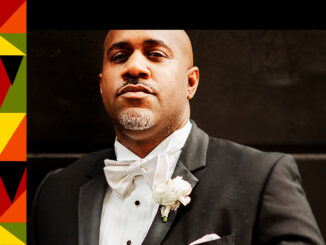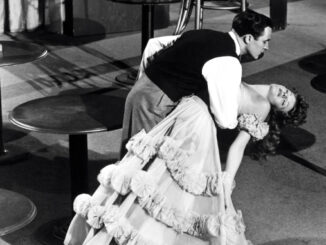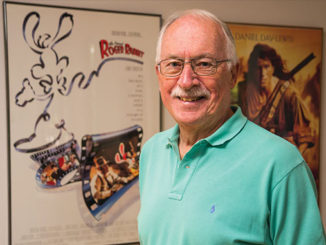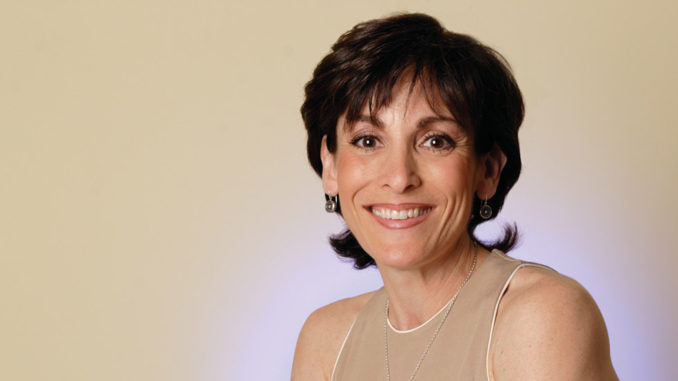
by Angela Barton
She didn’t set out to be a comedy editor, but that’s the genre in which Anita Brandt Burgoyne, ACE, became known––ever since cutting her first feature, A Very Brady Sequel. Her current project, due out in January, is the new Albert Brooks film, provocatively titled Looking for Comedy in the Muslim World. While having worked on a few independent films in he past, Burgoyne has jumped firmly into the indie arena with Brooks. Though sometimes financed by a studio, he remains steadfastly independent-minded; his films bear his stamp––a style and sensibility that’s all his own. And he commands Final Cut (not the Apple editing software).
Burgoyne worked for several years as an assistant and loved it because, “It appealed to my rather compulsive side.” She believes it helped her as an editor since she understands the process from start to finish. Burgoyne received her first editing credit on a Disney pilot, Hard Time on Planet Earth, which she co-edited with her father, the late award-winning editor Byron “Buzz” Brandt (Helter Skelter), and went on to co-edit several TV movies with him. As a team, they were nominated for an American Cinema Editors (ACE) Eddie Award for In the Line of Duty: The F.B.I. Murders.
Since then, she’s gone on to cut several feature comedies––including the giddy go-girl film Legally Blonde and the recent Confessions of a Teenage Drama Queen for Disney. She still switches back and forth between TV and film work, doing a TV movie when she wants to do something “edgy or interesting.” In 2003, she was nominated for an Emmy Award for Homeless to Harvard: The Liz Murray Story.
Burgoyne has managed to combine a family life and a career, and speaks with obvious pride about her two kids––Marnie, 19, and Hayden, 16. She jokes that she was “the most popular mom in school” when she worked on the Nickelodeon film Good Burger. Burgoyne brings a sense of humor along with a strong work ethic to any editing challenge. She describes herself as an “easy target” for a laugh, which may partly explain why she’s so good at cutting comedy––because she loves it.
“I love trying to figure out how to make a story work in the best way possible, how to evoke as much emotion or humor from a scene as I possibly can.” – Anita Brandt Burgoyne
Assistants enjoy working with Burgoyne because she understands and appreciates their work, she’s self-sufficient and she’s a quick and talented editor from whom one can learn a lot. This writer was fortunate to work with her last year on Teenage Drama Queen. CineMontage sat down with Burgoyne to talk about how she made the transition from assistant to TV to features and how her career led to working with Brooks.
CineMontage: How did you go from cutting cop films and melodramas to being known as a comedy editor?
Anita Brandt Burgoyne: When I got an agent, I told him I wanted to cut features. He said, “You’ve only got these TV credits, I don’t know if I’m going to be able to do anything for you.” The first thing he called me about was this short film: “They can’t pay, but do you want to do it?” I thought, “This is why I have an agent? To give me movies that don’t pay me anything?” That movie [The Taming Power of the Small], aside from winning many awards itself, resulted in my getting my first studio feature. The executive producer was Mark Johnson [Rain Man] and it was through Mark assuring Alan Ladd, Jr. that I could cut a film that I was given A Very Brady Sequel. I’d never cut a comedy before and I didn’t know the first thing about cutting comedy.
CM: What was your experience of working on that film?
ABB: I had a ball on A Very Brady Sequel. It was fun and creative in a new way for me. Before that, I didn’t know about timing and jokes, but it turns out I had an innate sense of it. It was also my director Arlene Sanford’s first feature, but she was greatly experienced in comedy and very funny herself. I had a fabulous crew of assistant editors and I just thought I was in heaven.
CM: What did you learn about comedy while working on it?
ABB: I like to credit Shelley Long [from A Very Brady Sequel] with teaching me quite a bit about cutting comedy––because what’s funny is so often not what is being said, but the reactions of the people who are listening. I would crack up watching her dailies because she was always working; there was a reaction to everything that was hysterical.
And the timing of it––like how much of a pause do you take before you say the punch line to make it as funny as possible––that was just experimentation, but I loved it.
“The things I really like about Looking for Comedy in the Muslim World is that even though the title sounds inflammatory, or un-PC, for the most part Albert Brooks really only makes fun of himself.” – Anita Brandt Burgoyne
CM: How did that film change your career?
ABB: I loved the comedy, but I didn’t think it was going to be all I was allowed to do after that, which was what happened.
Suddenly, I was the “comedy editor” and pretty much all my features have been comedies. Nobody looks at the 30 TV movies I did that didn’t have a single funny line in them. I am happy now to be working on something that’s not a teenage comedy––there’s not a school in sight, and I’m thrilled to be doing an adult comedy.
CM: Which brings us to the Albert Brooks film. How did that come about?
ABB: I got a call from my agent saying, “First you meet with his producers… you can’t read a script…and if they think you would be a good match for Albert, then you’ll meet with him.” So I meet with these people, and I get a call just a couple of hours later saying, “Can you meet with him today?” I was having lunch with a friend that day who had already met on this movie two weeks before, and she’s telling me other people had met on this movie, and I’m thinking, “This is a cattle call; I’m just part of the herd going in.”
So I meet with Albert, and he was very pleasant. He made me laugh of course, and I think that was part of the test––he wanted to make sure that you were going to laugh at his jokes. And I did, because I think he’s funny. Then a week later, I was asked to go back and was going to have to sign a non-disclosure agreement. So I knew I was going to hear something about the content of the movie.
When we meet, he starts to read me the script, and he’s reading it page by page. Which was great with me, because, you know––Albert Brooks is reading me his own material! And he read me the whole script, which I found hysterical. About halfway through, he looked up and said, “Well, as you can see, I really want you to do this.” So I said, “If you’re offering me the job, I would love to do it.” And then he read me the rest of the script. That was how I got the job; it was a very bizarre process.
“The biggest challenge is figuring out how to work for someone whose mind works quicker than my fingers can operate.” – Anita Brandt Burgoyne
CM: What can you tell us about the new film?
ABB: I think this one is in some ways quite different. His other films deal primarily with relationships––spouses, girlfriends, mothers––and are rather introspective. He delved into personal experiences and found the comedic elements in them. This film is most similar to his first film, Real Life, in that it is more expansive. Albert the filmmaker [Brooks plays himself] goes out into the world and into an arena that is completely foreign to him. This time he mines the comedy from being sort of a fish out of water and examines the differences in other cultures.
One of the things I really like about this film is that even though the title sounds inflammatory, or un-PC, for the most part he really only makes fun of himself. It’s rather benign politically, but studios or big companies seem to shy away from even the word “Muslim.”
CM: What is it like working with him?
ABB: Working with Albert is an incredible experience. I have worked with so many first time directors that it’s a pleasure to work with someone who understands the process of making a film from start to finish. But, like everyone, he has his little quirks. I think he’s a comedic genius, but because he’s so smart, thoughts and ideas come into his head a million times a minute. He is aware that these bits can come and go fleetingly so he leaves messages on my office voice mail so as not to forget.
I have a phone line designated for his messages––it picks up immediately after one ring so that he doesn’t have to wait lest he forgets what it is he is calling about. I can come in in the morning and find 20 messages with just random thoughts or directives. One Saturday, he called me and said, “Anita the voice mail line is filled up; can you get the messages off it? I want to say more.”
“I had a ball on A Very Brady Sequel… Before that, I didn’t know about timing and jokes, but it turns out I had an innate sense of it.” – Anita Brandt Burgoyne
CM: What about working with him during the editing process?
ABB: One thing I wasn’t used to is that Albert may have three or four takes of any given set-up, but within each one he may have 8 or 10 takes of all or part of the scene. It took me quite awhile to figure out how to keep track of his preferred takes, because as we looked at footage, he would just say, “That was a good one,” but it could’ve been somewhere deep in the middle of a take. And then he’d say, “Let me see all the places where I say this line,” and there could be 50 of them. And he kept saying, “Isn’t there a way for the Avid to remember every time I said ‘X’ line?” And I said, “No, Albert, that’s up to me.” He thought you could just say to the Avid, “Pull up the line––you know, this one,” but of course it doesn’t do that.
CM: Is he funny in person?
ABB: Albert is one the funniest, most quick-witted people I’ve ever met. Being in a room with him all day is like having a live comedy routine happening in front of you. He’s by nature a nervous guy who tends to worry about things, but even then he seems to deal with it by making jokes
CM: Is the character he plays in his films anything like his actual personality?
ABB: He is essentially like most of his characters, and this one especially, because he plays Albert Brooks, the comedian. Honestly, he’s a neurotic Jewish man, but fortunately, half my family is neurotic Jewish men––the other half is neurotic Jewish women––so it wasn’t difficult for me to relate to him. In fact, it feels very familiar.
CM: What was the biggest challenge of cutting this film?
ABB: Figuring out how to work for someone whose mind works quicker than my fingers can operate. We’d put a scene together, then we’d go through it, make a few fiddles, go through it again, make another little adjustment, and so on––all within a few minutes. Then he’d say, “Show me all my choices.” Well, all the versions only had minor differences––one different reading of one line, for example––so when we first started working together, I didn’t know to always save every little change so he could compare them.
“I sometimes still am in awe of the fact that I get to go to work every day and basically play with puzzles.” – Anita Brandt Burgoyne
CM: What was the importance of Legally Blonde in your career?
ABB: I think Legally Blonde was the first film I edited which I truly loved. I was very invested in it because I thought it was funny, but I also thought it had a really good message to give to girls and young women about just being themselves. At the time my daughter was about 15 so it was pertinent in my life. I’m always careful when I’m working on a film; if someone asks me if it’s good, I try not to gush, because I want to protect myself a little in case it doesn’t do well. But on Legally Blonde, I gushed.
CM: What do you think you contributed to it?
ABB: In the script, the parents of the Reese Witherspoon character and her sorority sisters were really vulgar, and the parents would say stuff that made you think, “There’s no way these awful people would have such a wonderful daughter.” I always put forth to the director that we have to take out anything like that, because it cheapens the movie to have the people around this great character being so vulgar. That’s a different movie, it doesn’t belong…
CM: …like a Farrelly brothers movie…
ABB: Exactly. It didn’t work. From the very beginning I was pleading to take all that stuff out, and ultimately everybody agreed. I’m really proud of the way I got rid of that element I found so distasteful…
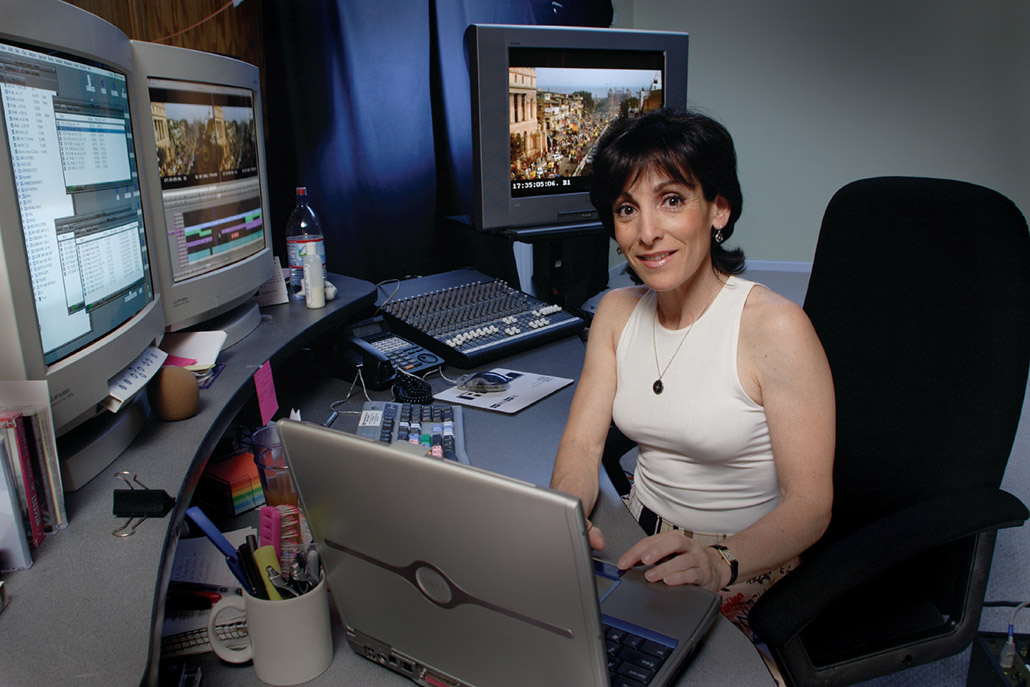
CM: What do you love about editing?
ABB: Almost all of it, actually. I love trying to figure out how to make a story work in the best way possible, how to evoke as much emotion or humor from a scene as I possibly can.
Every bit of it is fascinating to me, and I sometimes still am in awe of the fact that I get to go to work every day and basically play with puzzles. And they pay me really well sometimes.
CM: Do you have a favorite stage during the process?
ABB: My favorite part I think is re-cutting and taking time out; figuring out what you can take out without harming a story or a character, which ultimately helps the story work better because there’s less there.
CM: I’ve heard the typical film post-production schedule likened to pregnancy–– the first trimester is dailies, the second is the director’s cut and the third is screenings and the mix. Do you think that’s accurate?
ABB: Hopefully you aren’t nauseous during the dailies trimester…
CM: But the three sections––you get into the groove of dailies, the director’s cut and then the final push
ABB: …So to speak. Yes, and then the birth of the thing at the end. It’s a long process of creating something that will live on when you’re finished with it. The only difference is that with pregnancy, after the nine months are over, you then have this thing you have to take care of and love and nurture for the rest of its life. Whereas with a film you’ve edited, you can just take a look at it every once in awhile to see how it’s holding up over the years. Less long term care.
CM: How do you feel about being known as a “comedy editor?”
ABB: I’ve learned that I have a knack for comedy, and maybe it’s just that I’m an easy laugher. It’s a genre that I understand and I’m happy if that’s what they want me to do in features. I would like to be one of those editors who can go back and forth and cut anything, but you don’t get to do that very often. Lisa Churgin sometimes does that and Carol Littleton does it; they get a comedy, then they get a drama and everybody knows they can do it. Because the truth is that if you can edit, you can really edit anything


